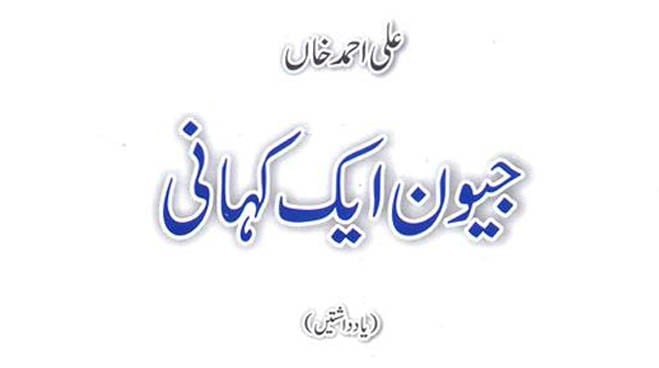
Ali Ahmad Khan’s memoirs are full of lessons learnt from contemplation of the human condition

Famous journalist and broadcaster Ali Ahmad Khan’s memoirs is a remarkable account of a remarkable life. The story of his wanderings is woven into the history of Pakistan during the years preceding and following the break-up of the state less than 25 years after its birth. A person of varied tastes and inclinations -- from giving tuitions, running a business, acting on the stage, to journalism and political activism and the sheer joy of vagabondage -- Ali Ahmad went through experiences in a single life-time for which ordinary human beings might need four or five lives.
Born into a well-to-do and in many respects a privileged family, Ali Ahmad Khan developed a habit, quite early in life, of wresting adversity from the jaws of prosperity by simply not signing on the dotted line in accordance with the wishes of his family or friends. Instead of studying and taking up jobs according to the instructions of his father, he drifted along on the wings of fancy and chance, gathering wisdom that only practical experience can nurture, losing balance here and there and eventually landing safely on his firm feet.
Ali Ahmad spent nearly two decades in East Bengal and learnt to share the Bengali people’s aspirations for freedom and dignity, and this not only as a reaction to the master-slave treatment he saw them receiving from the non-Bengali Pakistanis. His personal experience of abject poverty (by choice) enabled him to share the plight of the Bengali poor.
As a student he learnt to respect the non-Muslim teachers and scholars. And his participation in politics as an active worker of the National Awami Party provided him with a vantage point from where he could observe and analyse the country’s march towards disintegration.
While Ali Ahmad’s experiences in Karachi tell us a lot about the student activities and the ways of the youth as they struggled in those days to find their way in life, the most gripping parts of the narrative relate to his experiences in East Bengal between the start of the military operation in March 1971 and his departure from Dhaka after the surrender. His first-hand account of the wanton killings in retaliation to the military operations is a compendium of stories of human barbarity alongside tales of heroism and compassion. What happened in the camps after the surrender tells us of the ways human beings in distress adopt to meet small needs and how the toughs get together to quench their thirst for plunder.
During these days, Ali Ahmad discovered kindness among classes and individuals, who are condemned as a disreputable lot.
In the wave of killings after the military crackdown, Ali Ahmad Khan lost almost everything that was most precious to him -- his father and three brothers. Except for his sanity and love of the fellow-being. He insisted on addressing an Indian prisoner as ‘aap’ and not as ‘tum’ as demanded by the Pakistan military officer. It required not only extraordinary courage but a deep understanding of the humankind’s journey through wars, upheavals and massacres for Ali Ahmad Khan to try to find out how his father and brothers had met with their end. He plucks whatever bits of evidence are available about the great family tragedy in a matter-of-fact style. He does not fail to notice the beauty of the roses and the smell of pineapples in the ravaged jhompra that was his father’s home.
Ali Ahmad Khan had the courage to accept the killing of his father and brothers as atonement for what had been done to the Bengalis. But he was beaten at the post by his mother.
Breaking down under the loss of her husband and three sons, she wished for a gun so that she could kill three Bengalis (perhaps she wanted to avenge the killing of her sons only), but she corrected herself immediately and said: "But, my son, you must never do this for their mothers will suffer the pain that your mother is experiencing." This sentence changed his direction in life, says Ali Ahmad and adds: "Good and evil, sin and recompence, faith and community, freedom and slavery - in my view all standards changed."
This is not the only occasion when Ali Ahmad Khan seeks strength in philosophy. The pages of his narrative are full of lessons learnt from contemplation of the human condition.
The author ends his memoirs before he achieved success and fame as a journalist, as a trade unionist (went to jail for freedom of expression) and as a broadcaster par excellence. Perhaps he does not want to blow his horn. This lack of interest in self-projection is evident throughout the book. Here is a totally self-made person who does not claim to have done anything out of the ordinary. The only way nature helped him was to provide him with a large clan of uncles and aunts who could be found wherever he went and were usually prepared to help.
Ali Ahmad Khan knows the art of story-telling; he uses his words sparingly; he is candid enough to describe his affairs, and his capacity to laugh at himself or in moments of distress makes his writing a pleasurable read.
Jeevan Aik Kahani (Memoirs)
Author: Ali Ahmad Khan
Published: City Book Shop, Karachi
Phone No.: 021-35650623
Price: Rs375
Pages: 217